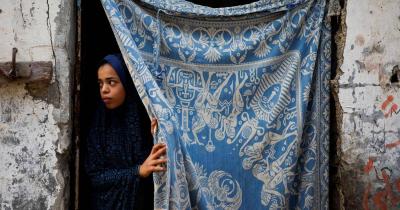Economists, along with some senior Israeli officials, believe that the violent protests organized by youth with the support of Hamas, the ruling party in Gaza, over several weeks reflect the harsh financial pressures in the blockaded territory. The protests reportedly erupted in response to the treatment of Palestinian prisoners in Israeli jails and visits by Jewish groups to the Al-Aqsa Mosque compound. However, a senior Israeli official pointed to the relative restraint shown by Hamas, which did not officially join the protests or launch more rockets at Israel. He noted that the more direct cause of the unrest relates to worsening economic despair in Gaza rather than long-standing Palestinian national demands. The Israeli official, who requested anonymity, stated, "The protests are about money... what we see at the fence (border) is a message. They are asking for financial assistance."
Around 2.3 million people live in the narrow coastal strip, where the per capita income is roughly a quarter of that in the Israeli-occupied West Bank, and over half of the population lives below the poverty line, according to International Monetary Fund estimates. In the recent unrest, Palestinian youth threw stones and explosive devices at Israeli forces along the border fence, while soldiers responded with live ammunition. Calm returned last week following negotiations involving mediators from Egypt, the United Nations, and Qatar.
### Political Demands
Sources close to the mediation efforts indicate that some of Hamas's demands are political, but easing the economic sanctions imposed on Gaza is central to maintaining calm along the border, at least for now. The sources expect Israel to announce a loosening of the blockade in the coming days, which may include issuing hundreds of additional permits for work in Israel. Israel has blockaded the territory while Egypt has imposed stringent restrictions, contributing to a paralysis of the sector's economy.
In 2021, Israel engaged in a 10-day war with Hamas, and since then, it has relaxed some restrictions imposed on Gaza, providing thousands of work permits in addition to measures aimed at facilitating exports and improving dilapidated infrastructure after years of inadequate funding.
### Fragile Ceasefire
A recent report from the International Monetary Fund stated that "lifting the blockade and easing the restrictions imposed by Israel is essential" for achieving any stable and long-term economic recovery in Gaza. The report indicated that Gaza has lagged far behind the West Bank over the past 15 years, primarily due to years of isolation and intermittent conflict since Hamas came to power in 2007. Seventy-seven percent of families in Gaza receive assistance, mostly in the form of cash or food.
With the official unemployment rate in Gaza exceeding 46 percent, Hamas faces significant discontent regarding its economic management, but the movement holds the Israeli blockade responsible for the sector's economic woes.
### Fragile Conditions
Bassem Naeem, a political official in Hamas in Gaza, remarked, "All these are indicators that the situation is fragile, and no official in Gaza will allow this explosion to burst inwards, and if it must explode, let it explode towards the party that caused these conditions, which is the occupation."
Hamas leaders argue that any calm in Gaza will remain precarious unless Israel lifts the blockade and ends "aggressive measures and assaults in the West Bank and Jerusalem," yet they do not show any signs of interest in pursuing a new war.
Israel has recognized the potential consequences of instability in Gaza, and thus has issued over 18,000 work permits for Palestinians there, allowing workers to earn roughly two million dollars daily while offering other forms of economic relief.
Bilal Najjar, who previously earned between 30 to 35 shekels (7.70 to 9.05 dollars) daily as a vegetable vendor in Gaza, now earns ten times that amount working in a restaurant in Lod, southern Israel, saying, "The permit is everything for me; it is my life. If the permit stops, my life stops."
### Clothing Sector
The clothing sector in Gaza, one of the chief beneficiaries of any easing of the blockade, has seen sales increase tenfold since 2015, the year following a previous war, and revenues this year are expected to surpass the 22 million dollars achieved in 2022. Bashir Al-Bawab, chairman of Unipal, one of the largest clothing factories in Gaza with partnerships with Israeli companies, stated, "If all crossings were open and the political situation was excellent, everything would be set for a greater recovery in Gaza for work and living standards."
Last month, Israel imposed a short-term blockade on exports from Gaza after inspectors reported discovering an attempt to smuggle explosives into the West Bank. This was followed by the closure of crossings used by workers heading to jobs in Israel and the West Bank in response to border protests.




